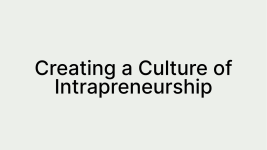In a world where “entrepreneur” is the buzzword on every podcast and LinkedIn post, there’s a quieter, more subtle force driving innovation from within — intrapreneurs. They’re not building startups in their garages. They’re revolutionizing products, services, and systems inside existing organizations.
Think of them as “corporate hackers” — breaking norms, testing bold ideas, and building from the inside out. And guess what? Every forward-thinking company desperately needs one (or many).
While traditional employees follow instructions and entrepreneurs break rules, intrapreneurs bend them. They're the ones who say, “What if we tried this instead?” and “Why don’t we build it in-house?” They take ownership like founders but operate with the tools and safety net of an established system.
Big names like Google’s Gmail, Facebook’s “Like” button, and Sony’s PlayStation? All born from intrapreneurial minds inside big corporations. They didn’t come from top-down orders — they came from bottom-up courage.
These inside innovators aren’t defined by title — they’re defined by mindset:
Great companies don’t suppress intrapreneurs — they nurture them. Leaders must create space for experiments, celebrate risk-takers, and offer autonomy without fear of failure.
Offer them:
Future-ready companies don’t just hire intrapreneurs. They build cultures that breed them.
Intrapreneurs are the secret sauce behind today’s most agile, innovative, and resilient organizations. They’re not waiting to start their own companies — they’re already building them inside yours.
So, the next time someone in your team challenges the “old way,” don’t shut them down. They might just be your company’s next big breakthrough.
Think of them as “corporate hackers” — breaking norms, testing bold ideas, and building from the inside out. And guess what? Every forward-thinking company desperately needs one (or many).
The Rise of the Intrapreneur
While traditional employees follow instructions and entrepreneurs break rules, intrapreneurs bend them. They're the ones who say, “What if we tried this instead?” and “Why don’t we build it in-house?” They take ownership like founders but operate with the tools and safety net of an established system.
Big names like Google’s Gmail, Facebook’s “Like” button, and Sony’s PlayStation? All born from intrapreneurial minds inside big corporations. They didn’t come from top-down orders — they came from bottom-up courage.
Intrapreneurial Traits You Can't Ignore
These inside innovators aren’t defined by title — they’re defined by mindset:
- Ownership mindset: They treat company problems as personal missions.
- Resilience: They push back when ideas are shot down.
- Curiosity: They explore possibilities others don’t see.
- Diplomacy: They rally cross-functional teams without formal authority.
Cultivating Intrapreneurs: A Leadership Superpower
Great companies don’t suppress intrapreneurs — they nurture them. Leaders must create space for experiments, celebrate risk-takers, and offer autonomy without fear of failure.
Offer them:
- Innovation labs or cross-functional projects
- Time to tinker (think Google’s 20% rule)
- Direct access to decision-makers
- Recognition for internal wins
Intrapreneurship: A New Growth Engine
Whether you're a startup scaling fast or a legacy giant trying to stay relevant, intrapreneurs are your growth hackers. They unlock new revenue streams, disrupt your own outdated models before someone else does, and bring startup energy into corporate frameworks.Future-ready companies don’t just hire intrapreneurs. They build cultures that breed them.
Final Takeaway
Intrapreneurs are the secret sauce behind today’s most agile, innovative, and resilient organizations. They’re not waiting to start their own companies — they’re already building them inside yours.
So, the next time someone in your team challenges the “old way,” don’t shut them down. They might just be your company’s next big breakthrough.


